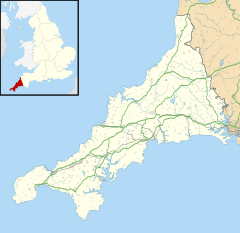Halsetown is a village near St Ives, Cornwall, England.[1]
| Halsetown | |
|---|---|
 Halsetown Inn | |
Location within Cornwall | |
| OS grid reference | SW507386 |
| Civil parish | |
| Unitary authority | |
| Ceremonial county | |
| Region | |
| Country | England |
| Sovereign state | United Kingdom |
| Post town | St Ives |
| Postcode district | TR26 |
Halsetown is an industrial village planned by the solicitor and politician James Halse and built in the 1830s. There was a tin mine nearby and also a ropewalk.[2] James Halse founded the village in the early 1830s in order to provide housing for his workers, making it one of the earliest planned settlements in England. The village was designed with houses laid out in a grid pattern, with each house having enough attached land (1⁄4 acre (0.10 ha)) to entitle the occupier to vote.[3][4]
The ecclesiastical parish was created in 1846 and the parish church (1857) was dedicated to St John the Evangelist.[5] A mission chapel was opened on 6 November 1878 because the parish church at St Ives, was too far for parishioners to attend.[6] The village is administered by St Ives Town Council.
Notable residents
editThe actor Henry Irving was brought up in the village, fostered by his aunt, Mrs Penberthy.[7][8]
References
edit- ^ Ordnance Survey: Landranger map sheet 203 Land's End & Isles of Scilly (Map). Ordnance Survey. 2009. ISBN 978-0-319-23289-7.
- ^ Todd, A. C. & Laws, Peter (1972) The Industrial Archaeology of Cornwall. Newton Abbot: David & Charles; p. 223
- ^ "History of Halsetown & The Old Chapel". Strives' Retreats. Retrieved 23 May 2021.
- ^ Craig Weatherhill (2017). The Place-Names of the Land's End Peninsula. Penwith Press. p. 97. ISBN 9781999777500.
- ^ Cornish Church Guide (1925) Truro: Blackford; p. 107
- ^ "Opening of a Mission Chapel at Halsetown". The Cornishman. No. 17. 14 November 1878. p. 5.
- ^ "Miss Ellen Terry". The Cornishman. No. 161. 11 August 1881. p. 4.
- ^ Bonython, John Langdon (1933–34). "Address of the President". Journal of the Royal Institution of Cornwall. XXIV (1 and 2): 8–9.
